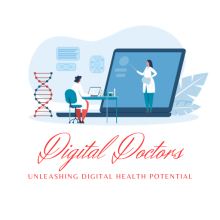Inspirational journeys
Follow the stories of academics and their research expeditions
Technology Entrepreneurship in Healthcare: Challenges and Opportunities for Value Creation

The intersection of technology and healthcare presents a
dynamic landscape teeming with both challenges and opportunities. Entrepreneurs
in this field are poised to revolutionize patient care, streamline operations,
and drive significant value creation. However, the journey is fraught with
complexities ranging from regulatory hurdles to integration issues. This
feature article delves into these challenges and opportunities, supported by
real-world case studies that highlight successful ventures in healthcare
technology entrepreneurship.
The Landscape of Healthcare Technology Entrepreneurship
The healthcare industry is experiencing a transformative
wave driven by technological advancements such as artificial intelligence (AI),
telemedicine, wearable devices, and blockchain. These innovations promise to
enhance patient outcomes, reduce costs, and improve overall healthcare
delivery. Entrepreneurs venturing into this space must navigate a highly
regulated environment while addressing the unique needs of healthcare
providers, patients, and payers.
Challenges in Healthcare Technology Entrepreneurship
- Regulatory
Compliance
- Navigating
the complex web of regulations, such as HIPAA in the United States and
GDPR in Europe, is a significant challenge. Entrepreneurs must ensure
their solutions are compliant to avoid legal repercussions and build
trust with stakeholders.
- Case
Study: Theranos
- Theranos,
once a promising startup, faced regulatory scrutiny that ultimately led
to its downfall. The company claimed to revolutionize blood testing but
failed to meet regulatory standards and provide transparent data. This
case underscores the importance of regulatory compliance in healthcare
technology.
- Theranos Website
(Note: The site is inactive post-dissolution)
- Data
Security and Privacy
- Protecting
sensitive patient data from breaches and ensuring privacy is critical.
Entrepreneurs must implement robust cybersecurity measures to safeguard
data.
- Case
Study: CyberMDX
- CyberMDX
provides cybersecurity solutions for medical devices and clinical
networks. Their proactive approach to identifying vulnerabilities and
preventing attacks highlights the importance of cybersecurity in
healthcare.
- CyberMDX Website
- Integration
with Existing Systems
- Many
healthcare facilities use legacy systems that are not easily compatible
with new technologies. Entrepreneurs must develop solutions that
integrate seamlessly with existing infrastructure.
- Case
Study: Epic Systems
- Epic
Systems is a leader in electronic health records (EHR). Their success
lies in the ability to integrate with a wide range of healthcare
systems, providing a unified platform for patient data management.
- Epic Systems Website
- Funding
and Financial Viability
- Securing
funding can be challenging due to the high costs associated with
healthcare technology development and the long timelines for regulatory
approval and adoption.
- Case
Study: Butterfly Network
- Butterfly
Network developed a handheld, smartphone-connected ultrasound device.
They successfully raised substantial funding and navigated regulatory
approval, showcasing a viable path to financial success in healthcare
tech.
- Butterfly Network
Website
Opportunities for Value Creation
- Improving
Patient Outcomes
- Technological
innovations can lead to better diagnosis, personalized treatment plans,
and enhanced patient monitoring, ultimately improving patient outcomes.
- Case
Study: AliveCor
- AliveCor's
KardiaMobile is a portable ECG device that allows patients to monitor
their heart health in real-time. This innovation has empowered patients
to take charge of their health, leading to earlier detection and
treatment of heart conditions.
- AliveCor Website
- Cost
Reduction
- By
automating processes and improving efficiency, healthcare technology can
significantly reduce operational costs for healthcare providers.
- Case
Study: Zocdoc
- Zocdoc
is an online service that allows patients to find and book appointments
with doctors. By streamlining the appointment process, Zocdoc reduces
administrative burdens and costs for healthcare providers.
- Zocdoc Website
- Enhanced
Access to Care
- Telemedicine
and mobile health technologies expand access to care, particularly in
remote and underserved areas.
- Case
Study: Teladoc Health
- Teladoc
Health provides telehealth services that connect patients with
healthcare professionals through virtual consultations. This has proven
invaluable in increasing access to care, especially during the COVID-19
pandemic.
- Teladoc Health
Website
- Data-Driven
Insights
- AI
and big data analytics offer deep insights into patient data, driving
more informed decision-making and predictive healthcare.
- Case
Study: Flatiron Health
- Flatiron
Health uses big data to accelerate cancer research and improve treatment
outcomes. Their platform aggregates and analyzes clinical data,
providing valuable insights for oncologists and researchers.
- Flatiron Health Website
Conclusion
The realm of healthcare technology entrepreneurship is both
challenging and rewarding. Entrepreneurs who can navigate the regulatory
landscape, ensure data security, integrate with existing systems, and secure
funding have the potential to create significant value. The real-world case
studies highlighted above illustrate that, despite the hurdles, successful
ventures in healthcare technology can lead to improved patient outcomes, cost
reductions, enhanced access to care, and data-driven insights. As the industry
continues to evolve, the opportunities for innovation and value creation in
healthcare technology are boundless.
Tags:
healthcare technology entrepreneurship regulatory compliance data security telemedicine AI in healthcare healthcare startups value creation in healthcare digital health health tech innovation patient outcomes cost reduction in healthcare Teladoc Health AliveCor Butterfly Network0 Comments
Categories
- Career Development and Opportunities in Digital Health 166
- White Papers 39
- IELTS For Medical Professional 35
- OET Exam Preparation 30
- Entrepreneurship and Innovation 26
- Healthcare Innovation 17





Leave a comment